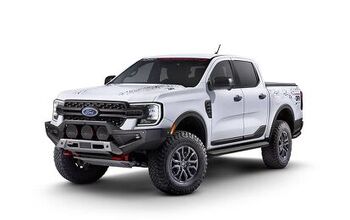GM Asks Suppliers to Sign Environmental Pledge, ESG Scoring

On Monday, General Motors publicly asked its suppliers to pledge themselves toward adherence to carbon neutrality. But the vow actually goes quite a bit further, incorporating numerous Environmental, Social, and Governance (ESG) scoring aspects we’ve seen being advanced by some of the world’s most powerful corporations, financial institutions, and world leaders.
In fact, the official name for the oath is the “Environmental, Social and Governance Partnership Pledge” and it’s already been associated with metrics defined by EcoVadis — a third-party assessor that focused on evaluating how individual companies integrate its preferred principles of sustainability, corporate responsibility, social cohesion into their business and management systems.
“There are economic and social imperatives in lowering emissions and addressing climate change while cultivating a just transition,” Jeff Morrison, GM vice president of Global Purchasing and Supply Chain, stated. “As we accelerate toward our vision of an all-electric future, our commitment to bringing everybody along includes our global suppliers whose collaboration is critical to promoting a sustainable, safe and better world.”
We’ve been tracking the progress of ESG scoring for a while ( it even came up yesterday) and have grown increasingly suspicious that it serves to advantage large multi-national organizations with the kind of capital necessary to make the outlined changes. While plenty of companies have jumped onto the eco-bandwagon for the cultural cachet that’s associated with going green, arguments have been made that the scheme doesn’t necessarily support the concept of sustainability. Critics believe that ESG has effectively become a tool for large organizations to give themselves a squeaky clean, greener image that might woo potential investors. But it is in no way attached to a business’s profitability — which one could argue represents an organization’s true sustainability.
Additional criticism has been leveled at the “social” aspects of ESG scoring, as such a metric would hinge largely on qualitative data. This is made worse by the fact that most schemes utilize differing (often shifting) targets. This phenomenon was explored in a 2019 paper from the MIT Sloan School of Management exploring the differences between the ESG ratings issued to six separate companies. The resulting data suggested that not all businesses are measured in the same way and that the system allotted for some companies to engage in truly abominable behavior while still getting a high ESG score — provided they made up for it elsewhere.
Those makeup points could stem from something like spending more money buying up carbon credits or vowing to hire women to executive positions while the company is simultaneously utilizing forced labor or engaged in untechnical medical testing. The issue is that it gives a simplistic and often rose-tinted picture of a business that could also be engaged in unsavory acts, even though human rights are supposed to be an essential component of ESG schemes. This could explain why so many large companies are interested. By nature of having deeper pockets, they’re afforded more opportunities to raise their ESG score and garner a good investment rating during a period where Wall Street seems to glom onto every green stock that emerges, regardless of the business model of the relevant companies.
Considering General Motors’ stock has been on the decline since January of 2022 and is now confronting worsening supply chain issues, running with ESG scores could be a good way to pump the stock. After years of seeing Tesla’s exceptional market performance and lofty IPOs from numerous tech companies that were effectively selling the concept of environmentalism with no tangible products, it’s not unimaginable to assume legacy automakers want a piece of that action.
Here’s what GM is asking suppliers to do as part of its Environmental, Social, and Governance Partnership Pledge:
Achieving carbon neutrality for their Scope 1 and Scope 2 emissions by dates based on their respective industry. These are 2025 or earlier for Professional Services, 2035 or earlier for Manufacturing and 2038 or earlier for Raw Materials and Logistics.
By 2025, achieving a minimum score of 50 in the EcoVadis Labor & Human Rights and Ethics pillars, which demonstrates a mature sustainability management system that covers employee health and safety, social dialogue, diversity/nondiscrimination, child and forced labor, and avoids corruption and anticompetitive practices.
By 2025, achieving a minimum score of 50 in the EcoVadis Sustainable Procurement pillar, which covers how GM’s suppliers understand and govern the social and environmental practices of their own suppliers and use their purchasing influence to advance sustainability.
The irony is that one could argue that ESG scoring is anti-competitive in itself since these metrics are ultimately tied to swaying where investors put their money based on the EcoVadis score, rather than their actual financial performance. We’ve already seen problems emerge, too. In 2021, DSW Group (owned by Deutsche Bank) got into trouble after its former head of sustainability, alleged the firm had grossly misrepresented its ESG capabilities in the 2020 annual report — calling it propaganda. Her actions triggered investigations by the U.S. Securities and Exchange Commission and German regulator BaFin.
It’ll be difficult to say whether or not GM’s initiative amounts to little more than greenwashing without more data. But the company has said that suppliers, representing 53 percent of its $76 billion in direct material annual purchase value last year, have already signed onto the pledge. It also vowed that it would continue supporting environmental efforts as it “identifies opportunities for significant reductions in greenhouse gas emissions and energy use, provide educational webinars and resources, and develop tools to help remove barriers in the transition to renewable energy.”
“GM’s ESG Supplier Pledge is a best practice example of how to work with suppliers and turn their ‘Everybody In’ vision into action,” said Pierre-Francois Thaler, Co-CEO of EcoVadis. “These specific and actionable targets are exactly the kind of engagement needed to accelerate their value chain towards positive impact, and to make business a force for creating a more sustainable world.”
Note that none of the above actually serves to improve the abysmal state that global supply chains are presently in and instead focuses primarily on changing the cooperate culture and messaging in a manner that would raise a company’s market valuation.
[Images: Linda Parton/Shutterstock]

A staunch consumer advocate tracking industry trends and regulation. Before joining TTAC, Matt spent a decade working for marketing and research firms based in NYC. Clients included several of the world’s largest automakers, global tire brands, and aftermarket part suppliers. Dissatisfied with the corporate world and resentful of having to wear suits everyday, he pivoted to writing about cars. Since then, that man has become an ardent supporter of the right-to-repair movement, been interviewed on the auto industry by national radio broadcasts, driven more rental cars than anyone ever should, participated in amateur rallying events, and received the requisite minimum training as sanctioned by the SCCA. Handy with a wrench, Matt grew up surrounded by Detroit auto workers and managed to get a pizza delivery job before he was legally eligible. He later found himself driving box trucks through Manhattan, guaranteeing future sympathy for actual truckers. He continues to conduct research pertaining to the automotive sector as an independent contractor and has since moved back to his native Michigan, closer to where the cars are born. A contrarian, Matt claims to prefer understeer — stating that front and all-wheel drive vehicles cater best to his driving style.
More by Matt Posky
Latest Car Reviews
Read moreLatest Product Reviews
Read moreRecent Comments
- SaulTigh Unless we start building nuclear plants and beefing up the grid, this drive to electrification (and not just cars) will be the destruction of modern society. I hope you love rolling blackouts like the US was some third world failed state. You don't support 8 billion people on this planet without abundant and relatively cheap energy.So no, I don't want an electric car, even if it's cheap.
- 3-On-The-Tree Lou_BCone of many cars I sold when I got commissioned into the army. 1964 Dodge D100 with slant six and 3 on the tree, 1973 Plymouth Duster with slant six, 1974 dodge dart custom with a 318. 1990 Bronco 5.0 which was our snowboard rig for Wa state and Whistler/Blackcomb BC. Now :my trail rigs are a 1985 Toyota FJ60 Land cruiser and 86 Suzuki Samurai.
- RHD They are going to crash and burn like Country Garden and Evergrande (the Chinese property behemoths) if they don't fix their problems post-haste.
- Golden2husky The biggest hurdle for us would be the lack of a good charging network for road tripping as we are at the point in our lives that we will be traveling quite a bit. I'd rather pay more for longer range so the cheaper models would probably not make the cut. Improve the charging infrastructure and I'm certainly going to give one a try. This is more important that a lowish entry price IMHO.
- Add Lightness I have nothing against paying more to get quality (think Toyota vs Chryco) but hate all the silly, non-mandated 'stuff' that automakers load onto cars based on what non-gearhead focus groups tell them they need to have in a car. I blame focus groups for automatic everything and double drivetrains (AWD) that really never gets used 98% of the time. The other 2% of the time, one goes looking for a place to need it to rationanalize the purchase.


































Comments
Join the conversation
As long as we are piling onto GM, here is The Truth About Why Some Of You Are So Stupid. I Mean, Some Of Us: https://youtu.be/IV3dnLzthDA
Lmao!!! So they are introducing another layer of make work on the industries', already a joke like this, rfp requests. If it costs too much all they will accomplish is limiting their vendor selection. No one outside of the rfp process will ever even hear about this, thats how empty gestures like this are.